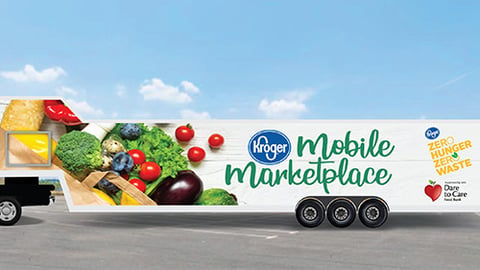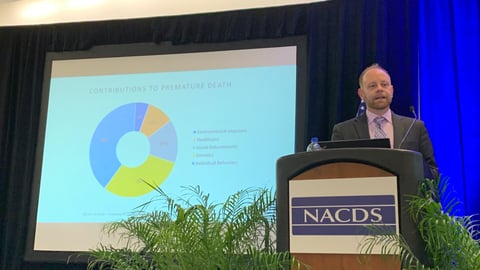Kroger Funds Innovators Preventing Food Waste, Hunger
The Kroger Co. Zero Hunger | Zero Waste Foundation has awarded grants to seven innovators, selected from nearly 400 applicants, that demonstrated ideas and solutions to prevent food waste. The first cohort of The Innovation Fund received grants ranging from $25,000 to $250,0000 per project, for a total of $1 million.
Establishing $10 million for The Innovation Fund is one part of the grocer's Zero Hunger | Zero Waste social impact plan, announced in 2017.
The foundation's board of directors, along with its advisory council for the fund through 84.51°, Feeding America, Foundation for Food and Agriculture Research, Kroger Technology, ReFED, Seed 2 Growth Ventures, and World Wildlife Fund, chose the recipients.
"We're excited to see our inaugural cohort work toward meaningful and measurable solutions to prevent, recover and recycle food waste, with the possibility of reducing food waste by up to 7.2 million pounds," said Jessica Adelman, president of The Kroger Co. Zero Hunger | Zero Waste Foundation. "The foundation's Innovation Fund was designed to bring like-minded organizations together as philanthropic disruptors – setting a new course on how to partner and change the world. The foundation's first cohort of innovators were individually selected due to their big ideas, shared vision and collaborative spirit in achieving a world with Zero Hunger | Zero Waste."
The first recipients are:
- Food Forest (Cincinnati)
Food Forest uses technology to source products through multiple channels, maximizing fulfillment efficiencies and minimizing the carbon footprint of delivery logistics. The Food Forest app uses dynamic pricing and recommendations to offer incentives to customers and mitigate wasteful behavior. It also provides pop-up grocery pickup points to low-access, high-need neighborhoods. - Imperfect (San Francisco)
Imperfect is a national online grocer creating a more sustainable and effective food system to better communities and the environment. The company sources imperfect produce and surplus food like grains, nuts, oil, bread, milk and cheese directly from farmers, growers and food purveyors, and delivers these goods directly to customers' doors through a customizable subscription service. - Mobius (Knoxville, Tenn.)
Mobius converts industrial organic waste streams from food, forestry and agriculture into renewable chemicals and materials. Its first products are biodegradable plastics and polymers created from industrial organic waste, with applications focused on agriculture, horticulture and foodservice packaging. - Replate (Berkeley, Calif.)
Replate creates technology to reliably redistribute surplus food from businesses and events directly to nonprofits in need. Leveraging the gig economy, it creates meaningful jobs while providing a simple platform for businesses and caterers to reduce their waste and support members of their communities. - Ripe Revival (Greenville, N.C.)
Ripe Revival is an innovative food brand on a mission to reduce waste and feed those in need. Its nutrient-dense protein gummies are crafted using proprietary extraction technology, providing a profitable solution for farmers' excess produce. Its products are packed with purpose, maximizing the potential of fruits and vegetables through nutritious, clean and fun foods. - Seal the Seasons (Chapel Hill, N.C.)
Seal the Seasons' mission is to increase access to local food by reducing on-farm food waste and providing family farms with a reliable income stream by selling locally and regionally grown frozen fruits and vegetables year-round. It partners with local family farms on a state-by-state basis to source local produce while in season, freeze it within 24 hours of picking and sell it to local grocers in the grower's home region. - Winnow (Iowa City, Iowa)
Winnow builds artificial intelligence tools to help chefs measure food waste and provide stakeholders with transparent, measurable and actionable data, helping run more profitable and sustainable kitchens. The data communicates food waste reduction opportunities and details where food is being lost — whether as a result of customer food preferences, preparation, storage or overproduction issues.
Cincinnati-based Kroger employs nearly half a million associates who serve more than 11 million customers daily through a seamless digital shopping experience and 2,761 retail food stores under a variety of banner names. The company is No. 2 on Progressive Grocer’s 2019 Super 50 list of the top grocers in the United States.





